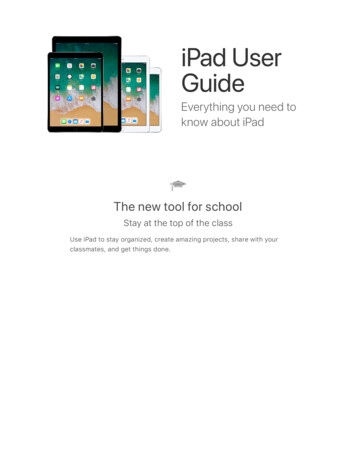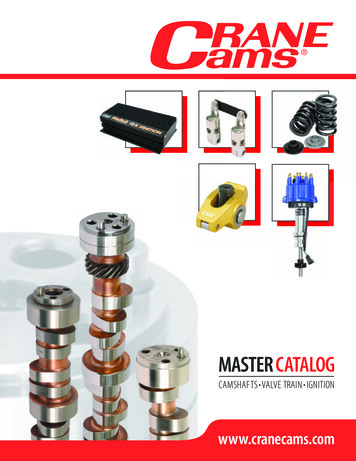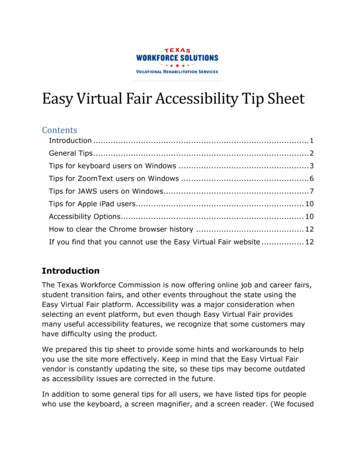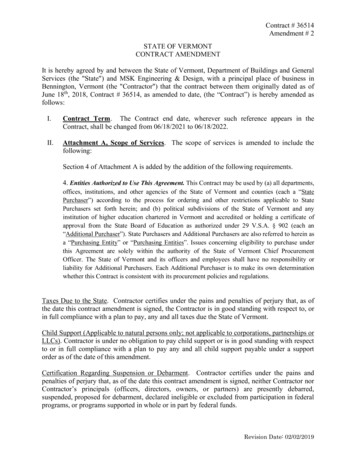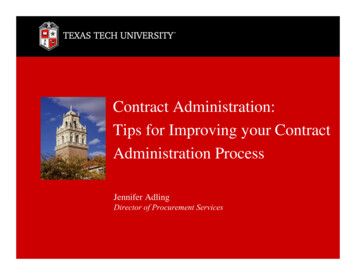
Transcription
Contract Administration:Tips for Improving your ContractAdministration ProcessJennifer AdlingDirector of Procurement Services
Contract AdministrationFollowing the award of a contract, themanagement actions that must be taken to assurefull compliance with all of the terms andconditions contained within the contractdocuments(s), including price.*From NIGP Public Procurement Dictionary ofTerms.
Contract ManagerA person employed by an agency that is chargedwith oversight of the overarching process toensure that a contractor has performed inaccordance with the SOW. Responsible for theprocurement process, contract formalizing,serving as a contact on contractual matters,serves as the repository for records, monitorscompliance, manages the change order process,and oversees the contract close-out process.
Contract AdministratorA person employed by an agency that isobligated with ensuring that the requirements ofthe contract are completed in a satisfactorymanner to the end-users. It is the obligation ofthe CA to report information, providedocumentation, and ensure that the contracts areefficiently carried out.
Contract Administration TeamA cross-functional team comprised of such members asthe procurement contracting officer, subject matterexpert, IT, engineering, legal advisors, price and costanalysts, quality assurance specialists, contractingofficer’s representative who all offer their expertise to thecontract.*From NIGP Public Procurement Dictionary of Terms.The Contract Manager and Contract Administrator aremembers of the CAT.
Contract Management pplierContractAdministrationTeamOther FunctionalTeams
Contract Adminsitration Development ofSpecifications Inspection andAcceptance Contract Kick-Off Dispute Resolution Progress Meetings Invoice Reviews Monitoring Contract Close-out Reports Automation! Documentation
Development of Specifications One of the most important steps in theContract Administration process is thedevelopment of the specifications. Emphasisshould be placed on planning and researchingthe requirements of the goods or services to beprovided. Failure to include all of therequirements in the specifications can lead toa failure in the Contract Administrationprocess.
Development of SpecificationsWhat?When?Where?How Much?Why?
Contract Kick-Off§ Establish a list of responsibilities of theContract Advisory Team.§ Establish an agreement with the ContractAdministrator on oversight responsibilities.§ Conduct a Contract Kick-Off meeting withthe Contract Advisory Team and thevendors representatives.§ Establish a timeline for contractcompliance
Contract Kick-Off Meeting Goals of Each Party Timeline Deliverables Resources Reports Statutory and Policy Requirements Close-out Expectations
Timeline
Kick-Off Meeting AgendaGoal and Objective for the meetingReview of AgendaIntroductionsAgency Team and their roles (point of contact for Contractor)Communication ProtocolImplementation Timeline1.Decisions or obstacles impacting timeline2.Factors to be considered3.Due dates for gathering & definition of requirements (if applicable)4.Impact on other agencies/divisions/units (if applicable)5.Specific Contractor implementation tasks6.Specific Agency implementation tasksStructure and Frequency of future meetingsFinancial and Performance Monitoring Considerations
Progress Meetings Format Duration Frequency On-site or Remote?
Progress Meetings Goals and Objectives of Both Teams Financials Cost Savings/Revenue Next Steps Reports
MonitoringMonitoring - a tool, whereby certain proceduresare developed to assure the public entity thatcontracted services are being delivered inaccordance to the terms and specifications of thecontract.*NIGP – Dictionary of Terms
Monitoring Monitoring Quality Monitoring Change Orders Monitoring Schedules Monitoring Disputes Monitoring Budgets and Payments Monitoring Subcontractors Monitoring Reports Monitoring Acceptance and Close-out
MonitoringInadequate monitoring is often the result of the following: Poorly established criteria for evaluating vendorperformance; Failure to Communicate and Document; Failure to conduct follow-up reviews to ensure thatcorrective action was taken; and, Failure to identify the risk and level of reviewnecessary for each vendor.
Monitoring Inspections Periodic Acceptance Final Random Sampling Reports/Data Audits Internal External
ReportsClearly define the report requirements,frequency, content, format, and audience in thespecifications. In addition, if the reports arerequired for statutory or policy purposes, providesupporting documentation to support the report.
Examples of Reports Service LevelReports Historical Metrics Asset Report Progress/Milestone Reports SBE/HUB Business Reports Product Usage Ordering ActivityRevenue ReportsStatutory ReportsRegulatory ReportsClose-out Reports
Documentation Specification Development Bidding/Proposal Evaluation Contract Negotiation Contract Administration Close-out
Contract File Documentation Contract Bid Documents Notice of Award Bonds andInsurance Conflict of InterestForm Post Award Notice to Proceed PerformanceMonitoring Renewals Amendments toContract Acceptance Rejection Price Escalations Liquidated Damages Minutes fromMeetings Close-out Training Materials Warranties DisputeDocumentation “Stop Work” orders Terminations Inspection Punch-list Cure NoticesGeneralCorrespondence Receipts Invoices
Documentation1. Contract Monitoring and AdministrationChecklist2. Contract Management Checklist3. Contract Close-out Checklist
DocumentationThis Contract Monitoring & Administration Checklistshall be used by the Contract Administrator as defined inOperating Policy 72.04 to manage the above referencedcontract. The use of this Checklist helps to assure propermanagement of the contract and provides a record thatprofessional management practices were used in themonitoring and administration of the contract.ThisChecklist is in addition to, and not a replacement of, therequirements in Operating Policy 72.04 and anydepartmental required monitoring processes and procedures.Any questions concerning the use of this Checklist can bedirected to Contracting Office.
DocumentationI hereby certify in compliance with Operating Policy72.04 that I have monitored the vendor’sperformance, managed university resources used inthe contract performance, authorized paymentsconsistent with the contract documents, resolved anddocumented minor disputes in a timely manner andcorresponded with the Contracting Office whennecessary, documented significant events ormilestones, and maintained appropriate records asrequired by applicable record retention law.
Inspection and AcceptanceInspection ensures that the goods or services arecompliant with terms and conditions of thecontract. After satisfactory inspection, a finalacceptance should be granted.
Inspection and AcceptanceInspection ensures that the contract is fullyperformed by guaranteeing that the goods orservices are received in compliance with thespecification.Acceptance entitles the contractor to paymentand limits the rights of the agency to seekremedy if contract non-compliance is foundlatter.
InspectionA standard inspection clause should address thefollowing responsibilities for each party: Right to inspection Cost of Inspection Place of Inspection Allowance for Testing Time of Inspection* NIGP – CPPO Prep Book
AcceptanceUpon the conclusion of inspection or testing, theagency shall accept or reject the goods orservices. Acceptance should be formalized inwriting and may require acceptance by bothparties. Any remaining deficiencies that need tobe addressed, should be done in writing with aplan established for correction.
RejectionIf goods or services are rejected, the agency canpursue any of the following: Determine is the vendor is entitled to partial,full, or no payment. Pursue corrective action Pursue adjustment in price Determine if there is a default and pursuedamages.* From the NIGP CPPO Prep Guide
Dispute ResolutionA dispute is a contractual disagreement ormisunderstanding between contracting partiesspecific to contract provisions or language.Resolution is usually through pre-establishedadministrative procedures or agreed uponalternative dispute resolution provisions.* From the NIGP CPPO Prep Guide
Dispute ResolutionThe process must be clearly defined in thespecifications including any statutory language.Most government agencies cannot agree tobinding arbitration and this language must bemodified in the contract.
Dispute ResolutionTo the extent that Chapter 2260, Texas Government Code, isapplicable to the Agreement and is not preempted by other applicablelaw, the dispute resolution process provided for in Chapter 2260 andthe related rules adopted by the Texas Attorney General pursuant toChapter 2260, will be used by TTU and Contractor to attempt toresolve any claim for breach of contract made by Contractor thatcannot be resolved in the ordinary course of business. The chiefbusiness officer of TTU will examine Contractor's claim and anycounterclaim and negotiate with Contractor in an effort to resolvesuch claims. The parties specifically agree that (i) neither theexecution of the Agreement by TTU nor any other conduct, action orinaction of any representative of TTU relating to the Agreementconstitutes or is intended to constitute a waiver of TTU’s or the state'ssovereign immunity to suit; and (ii) TTU has not waived its right toseek redress in the courts.
Invoice ReviewsInvoices should be reviewed by the ContractAdministrator for compliance with the contract.Payment should not be made for any goods orservices not received. The receipt shall documentthe Contract Administrator’s acceptance of theinvoice. In addition, Accounts Payable shouldreview the invoice against the PO/contract forcompliance. If review of invoices is not feasible,the Contract Manager may elect to performrandom invoice reviews for compliance.
Invoice ReviewsPayment terms should be defined in thespecifications.§ Net payment days§ Method of payment (ACH, Check, Card)§ Prompt Payment Discounts§ Advance Payments§ Progress Payments§ Completion Payments§ Withholding Payments§ Assignment of Claims
Contract Close-OutA contract is complete when all obligationscontained therein have been fulfilled by bothparties. Once the parties recognize theacceptance, the parties shall complete theclose-out process. Universities should havea close-out checklist to guide through thecompletion of major or high-riskcontracts/purchases.
Automation1. Contract Repository2. Contract Drafting3. Contract Routing4. Signature Platform
Contract Repository
Contract Repository
Contract Repository General Summary Soft Copy ContractAdministrators Budget Compliance Custom Fields Effective Date Expiration Date Renewal Features wNotifications Spend Reports Insurance Tracking Integration withPurchasing System
Contact DraftingMany contract platforms are available that allowthe user to develop templates. The templates allowthe preparer to create contracts by plugging incertain fields. This helps the University byestablishing consistent contract termininology.
Signature PlatformAllows the University to submit electronic copiesof agreements to vendors and other parties for adigital signature. The parties must agree torecognize the digital signature.
ResourcesFollow us on Twitter @TxTechProcureEmail: techbuy.purchasing@ttu.eduWebsite: http://www.depts.ttu.edu/procurement/Phone: 806/742-3844
ResourcesThe following resources were used to supplementthis presentation:NIGP Public Procurement Dictionary of TermsNIGP CPPO Prep BookPurchasing Handbook by George Aljian
Contract Administration process is the development of the specifications. Emphasis should be placed on planning and researching the requirements of the goods or services to be provided. Failure to include all of the requirements in the specifications can lead to a failure in the Contract Administration process.







